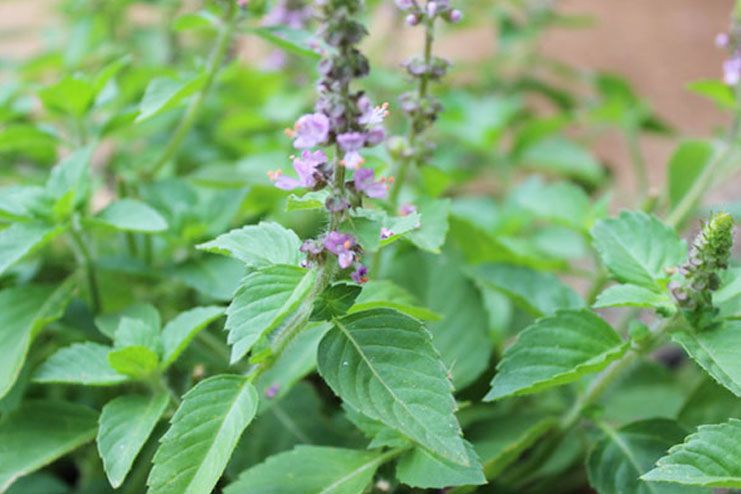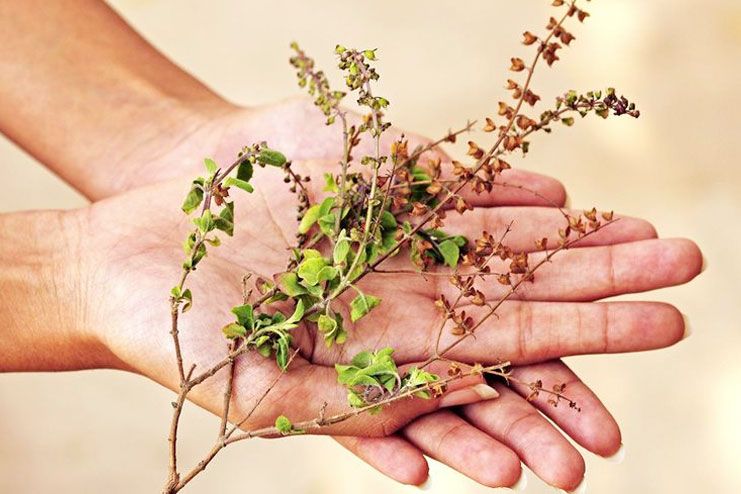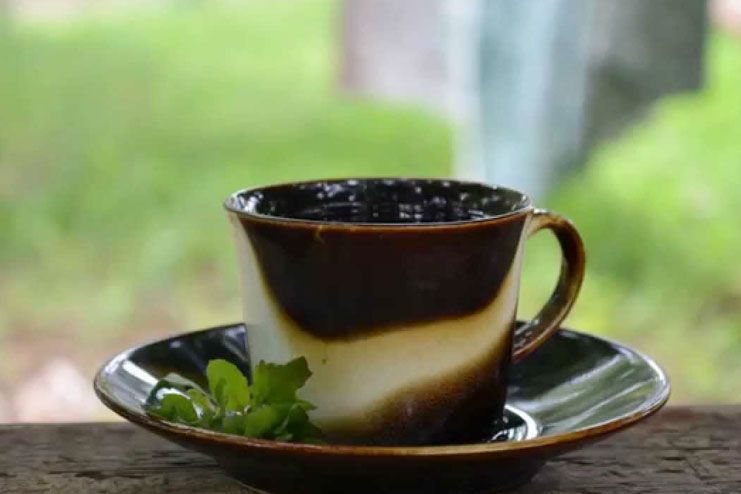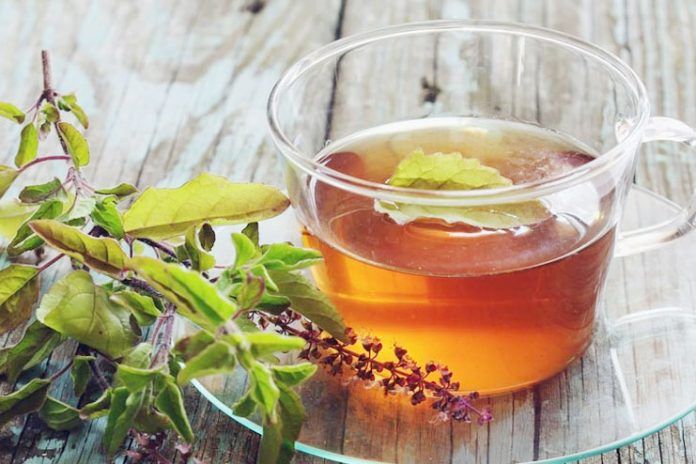Affiliate Disclaimer
Some links in this article are affiliate links. We may earn a small commission if you make a purchase through these links, at no extra cost to you. We only recommend products we find useful to our readersTea is a popular everyday beverage worldwide. Most of us are very much aware of the flavour of the tea and would have tried different tea varieties like green tea, black tea and white tea. But, have you ever tried tulsi tea? Tulsi tea has been gaining popularity across the world specially for its medicinal values. Several studies revealed the therapeutic effects of this wonder herb. Interested to know more about tulsi tea benefits? Read through to learn the lesser known facts and incomparable health benefits of tulsi tea or holy basil herb tea.
What Is Tulsi Tea?
Tea made of Tulsi leaves is called tulsi tea. Tulsi (Ocimum tenuiflorum or Ocimum sanctum) is a plant that is commonly known as holy basil. It is of religious significance and is native to Indian Sub-continent. The word ‘tulsi’ means the incomparable plant. It belongs to the perennial herb family called Lamiaceae family. It widely grows in the Southeast Asian countries.
Major varieties of tulsi plant include Krishna tulasi, Rama tulasi, and Vana tulasi. Tulsi is worshiped by hindus as the earthly manifestation of the goddess lakshmi. It is a part of ayurvedic medicine for years. Holy basil leaves are also a part of Thai cuisine. It is planted in gardens as a common insect repellant. And tulsi leaves are also used to prepare tulsi tea.

Tulsi tea is a popular herbal infusion which is free of caffeine. This beverage is full of nutritional properties.
Nutritional Facts And Properties Of Tulsi Tea:
Tulsi tea comes with strong astringent and strong aroma. It may have bitter flavour or spicy or floral and peppery notes.
One-quarter cup of fresh holy basil leaves (six grams) includes: 1 calorie; No cholesterol; 0.2 grams of sodium; 0.2 grams of carbohydrates; 25 micrograms vitamin K; 317 IU vitamin A;1 milligrams manganese.
- Basil leaves contain polyphenolic flavonoids like orientin and vicenin, which act as antioxidants.
- It contains essential oils like linalool, limonene, eugenol, citronellol, citral, and terpineol – known for their antibacterial and anti-inflammatory properties.
- The low-calorie herb has no cholesterol and is full of essential nutrients, minerals, and vitamins.
- Basil herb contains vitamins like beta-carotene, cryptoxanthin, vitamin-A, lutein, and zeaxanthin.
- A yellow flavonoid carotenoid compound called Zea-xanthin is selectively absorbed into the retinal macula lutea to filter harmful UV rays from reaching the retina.
- Vitamin K in basil helps produce clotting factors in the blood and helps with mineralization and bone strengthening.
- A good amount of minerals like manganese, potassium, copper, and magnesium in basil leaves help control blood pressure and heart rate.
- Basil leaves are an excellent source of manganese and iron. Hence, it helps improve the oxygen carrying capacity of the blood.

Benefits Of Tulsi Tea:
The therapeutic and health benefits of tulsi are mainly associated with an active ingredient Eugenol. Ursolic acid and carvacrol both have antimicrobial properties. Mainly the antioxidants in tulsi help the body fight free radicals responsible for several chronic degenerative diseases.
More medicinal benefits holy basil plant include:
- The health benefiting essential oils in holy basil leaves like eugenol, citronellol, citral, limonene, linalool, and terpineol possess anti-inflammatory, and antibacterial properties.
- Eugenol possess the enzyme-inhibiting effect, which offers relief in individuals with inflammatory health problems like osteoarthritis, rheumatoid arthritis, and inflammatory bowel conditions.
- Basil herb Oil has anti-infective functions and inhibits pathogenic bacteria like Staphylococcus, Shigella, Enterococci and
- Basil tea or the brewed basil water helps relieve nausea and come with mild antiseptic functions.
12 Incredible Health Benefits of Tulsi Tea
Include cardiovascular benefits, weight reduction, other benefits from respiratory diseases, diabetes, cancer, arthritis, digestive system benefits, etc.
- Improve Respiratory Illness
- Relieves Fever
- Fight Cardiovascular Diseases
- Promotes Oral and Dental Health
- Kidney Stones and Digestive Disorders
- Helps to Reduce Weight
- Tulsi Tea Benefits for Skin and Hair
- Helps Fight Diabetes
- Tulsi Tea Can Fight Cancer
- Helps Quit Smoking
- Tulsi Tea Helps Cure Arthritis
- Improves Nerves System Functioning
1. Tulsi Tea Helps Improve Respiratory Illness:
Tulsi is an excellent cure for respiratory illness as simple as cold and as severe as asthma and bronchitis. It comes with expectorant, immunomodulatory, and antitussive properties. Its antibacterial and anti-inflammatory properties help fight infection-causing agents of respiratory illness.
2. Tulsi Tea Is Proven To Relieves Fever:
The antimicrobial properties of tulsi leaves aid treat mild fever and helps with speedy recovery from any illness. It works great as an antipyretic agent and cools down the body temperature. Any fever-like condition, do not hesitate to pick a cup of tulsi tea.
3. Tulsi Tea Helps Beat Stress And Fight Cardiovascular Diseases:
Magnesium present in the tulsi extract is vital in fighting heart diseases. The holy basil leaves are cholesterol-free and hence are good at keeping cholesterol levels and blood pressure under control.
4. Tulsi Tea Promotes Oral And Dental Health:
Since ages, tulsi is being used as a wonder herb for dental and oral care. The antibacterial properties of the holy basil herb helps fights oral germs besides regulating blood flow in the body. It acts as a natural mouthwash and can fight with oral diseases like mouth ulcers, gum bleeding, etc.
5. Tulsi Tea Fights Kidney Stones And Digestive Disorders:
Herbs are always smooth on stomach and so are tulsi leaf extracts, which are proven to improve digestion besides aiding with liver health. As Tulsi works as a detoxifier and diuretic, it helps maintain kidney health. The essential oils in tulsi leaves help break down kidney stones and improve kidney functioning.
6. Tulsi Tea Helps Reduce Weight:
If you are looking for supplements or weight-loss products that help shed extra calories, a cup of tulsi tea would help. Several studies revealed the efficiency of tulsi in offering effective and safe weight-loss results. The holy basil tea works by burning the extra calories and increasing the body metabolism.
7. Tulsi Tea Benefits For Skin And Hair:

Tulsi extract works excellently for skin and hair health because of its nutrients, polyphenols and antioxidant properties. Its nutrients also reduce itchiness in the scalp and reduce unusual hair fall. Hence, a cup of holy basil tea every day helps stay young and active.
8. Tulsi Tea Helps Fight Diabetes:
Daily intake of Tulsi is known to reduce the blood sugar levels to optimum levels. It works well in metabolising carbohydrates and fats, keeping the risk of diabetes at bay.
9. Tulsi Tea Can Fight Cancer:
Several studies also reveal that tulsi may offer protection against several cancer types due to its strong anti-carcinogenic properties and antioxidant properties. It acts by neutralizing several dangerous chemicals that promote carcinogen cell-formation.
10. Tulsi Tea Can Help Quit Smoking:
Surprisingly, a cup of tulsi tea every day can help you stay away from psychological and physical dependence on smoking. Ayurveda heavily relies on using tulsi tea to cease smoking.
11. Tulsi Tea Helps Cure Arthritis:
Chronic illnesses like arthritis can also be cured using tulsi leaf extracts and tulsi tea. The antioxidant and anti-inflammatory properties of tulsi effectively fights with free radicals responsible for the degeneration of joint tissues.
12. Tulsi Tea Improves Nervous System Functioning:
It acts excellently in beating stress hormones and thereby tulsi leaves beat anxiousness. The adaptogenic herb helps fight free radicals and soothes nerves. It can also act as a natural medicine for headache and stress after a hectic day.
How To Select And Store Holy Basil Leaves?
Chose fresh organic basil over the dry ones for tea preparation. Fresh tulsi leaves are rich in essential oils and offer superior flavor. Follow these instruction when selecting and storing tulsi:
- Select basil leaves that do not have dark, yellow spots.
- Pick high quality dry basil seeds and leaves.
- Sun Dried or radiation subjected basil leaves have lesser concentrations of essential oils, carotene levels and Vitamin C.
- Fresh sweet basil leaves are to be stored in the refrigerator at proper humid conditions.
- Stored dried basil in a sealed container.
- Store the container with dried basil at cool, dry and dark place.
How To Make Tulsi Tea?
Like any other tea, dried or fresh tulsi leaves are steeped in hot water to make tulsi-tea beverage. Follow these simple tips while preparing tulsi tea:
- Wash fresh basil leaves under running water.
- Wash thoroughly to remove the dirt or pesticide residues.
- Add the basil leaves after the water is thoroughly boiled to retain the flavour.
- Avoid prolonged steeping to retain the benefits.
- Serve hot in your favourite cup.

Side Effects of Tulsi tea:
Even though no enough evidence to support, a few side effects are associated with basil tea. Some of them include:
- Better to avoid tulsi leaf tea during breastfeeding and pregnancy as there is no enough research that says basil is safe during these phases. To be on the safer side it is better to avoid if you are pregnant or a nursing mother.
- Holy basil is believed to slow down blood clotting. Hence, it is better to avoid holy basil tea after the surgery. It is better to stop the tulsi tea consumption at least 2 weeks before a scheduled surgery.
- Excess tulsi consumption causes eugenol overdose that may lead to poisoning.
- People who are on diabetic medications should not consume excess tulsi tea as it would lead to reduced blood sugar levels, causing a condition called hypoglycaemia.
- Although no enough research is done in this area, tulsi tea is associated with decrease in the sperm count, thereby affecting fertility.
- Tulsi may get into drug interactions. For example, tulsi might reduce the amnesic effect of drugs like diazepam and scopolamine. Otherwise, these drugs reduce vomiting, nausea and nervousness, anxiety respectively.
In conclusion, tulsi tea offers amazing potential health and medicinal benefits. A sip of tulsi tea everyday not only helps with physical well-being but also aids mental well-being. Include this herbal beverage in your daily range of fluids to take off the emotional stress as well as the infectious diseases. However, never forget to take it in moderation.
FAQs:
1. When To Drink Tulsi Tea?
Tulsi tea can be consumed anytime throughout the day from morning to night, but has to be taken in moderate amount. The strength and quantity of the organic holy basil tea helps with quick recovery.
2. How Many Cups Of Tulsi Tea Can Be Drunk Per Day?
Maximum 3 cups tulsi tea per day offer complete health benefits of holy basil leaves. However, just a cup everyday also works out. Care should be taken while adding the amount of holy basil leaves as the tulsi consumption should be in moderate amount to avoid any possible side effects.
3. Does Tulsi Tea Contain Caffeine In It?
Tulsi tea or holy basil tea is caffeine free. However, if it is consumed in fusion with other tea varieties for black tea or green tea, it contains caffeine based on the quantity of fusion.
4. Where To Buy Tulsi Tea?
Buy and store organic tulsi leaves from a reputed brand after thoroughly examining the process. Store as per the directions to retain the freshness for at least two years. It can retain the freshness when stored in cool dark place away from light and moisture.
5. What Does Tulsi Tea Taste Like?
Tulsi tea comes with strong astringent and strong aroma. It may have bitter flavour or spicy or floral and peppery notes. It may also be of sweet flavour based on the variety of tulsi leaves used in the tea.
6. Is Tulsi Safe During Pregnancy?
It is considered as a myth to avoid holy basil leaves during pregnancy. However, no enough research support the consumption of tulsi during pregnancy too. TO be on the safer side, better to stay away from it during pregnancy.
7. Is Holy Basil Help Sleep Well?
Holy basil or tulsi has the properties to lower the elevated cortisol and regulate blood sugar levels. It helps keep you active, energetic and alert during the day time and thus, automatically aiding with better night sleep.
8. Is Tulsi Good For Skin?
Tulsi works wonders on the skin. You may apply it as paste over your skin, eat tulsi raw or consume the extract in the form of tea. It mainly helps purify the blood, remove toxins from the body and prevent pimple and acne formation on the skin. Boil tulsi leaves in water and prepare a skin toner.
9. Does Tulsi Act As A Stimulant?
Tulsi in not a stimulant and can be taken even before bed time. It also aids with better sleep. It has rejuvenating properties and can boost energy.
In this Article


















